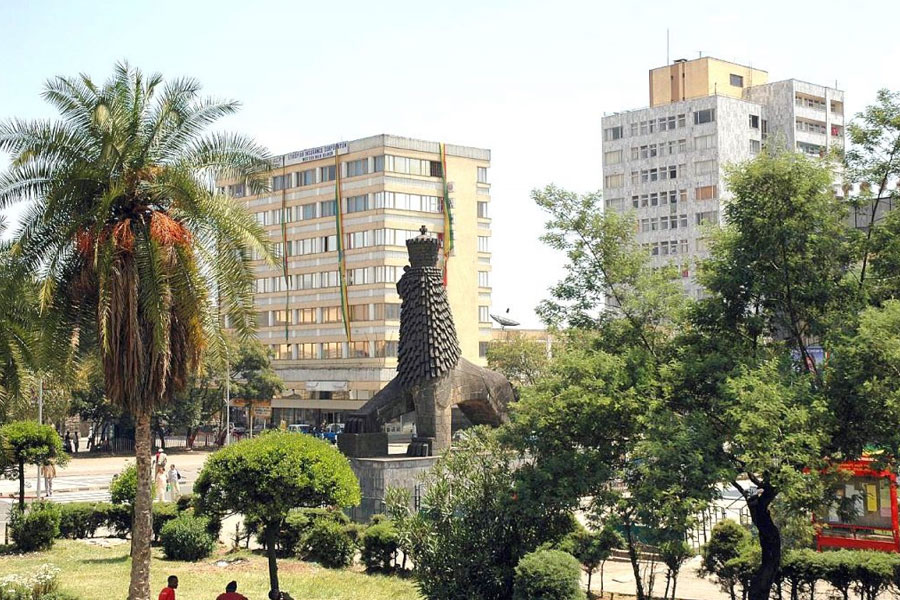
Fortune News | Jun 01,2019
Oct 12 , 2019
By Eden Sahle
I often pass by Amora Building, owned by Metals & Engineering Corporation (METEC) located in the Gerji area. There is always a long line of the blue public service buses inside and outside their compound. It so happens that I repeatedly experience harassment from the men who sit inside the buses. Apart from the many bizarre words coming from inside the bus, what used to surprise me the most was the heavy cloud of smoke emanating from the buses. The smoke is visible and has a uniquely unpleasant odour.
Recently, while passing by the same street, the person I was meeting on business offered to walk me out of his office. As I was prepared to wish him a good day, I saw his face changed suddenly looking toward the blue buses parked at the METEC compound. When I turned around, I saw the usual smoke coming out from the parked buses.
Before I asked him, he read my mind and began explaining to me about the smoke and the unpleasant odour. He said the staff inside the bus smoke shisha and chew khat all day. We both were saddened about the abuse of public property and why no one does something about it.
These are not the exceptions, there are so many public properties and time being abused around Ethiopia in so many forms. Unlike the private sector where staff work under strict supervision to meet expectations and to keep their position, public servants have the privilege to work with unaccounted expectations and with no fear of losing their job. Corruption, lack of integrity and accountability, coupled with weak institutions, continue to aggravate the situation.
With no checks and balances on autonomous institutions, we do not have enough individuals in public service who are serving in good faith, struggling with the bottlenecks in the system. Ethiopia, despite efforts and rhetoric, has been unable to realise structural change and remains stuck. And without accountability, there will always be the risk of repeating what left us poor in the first place.
Irresponsible public servants erode trust in public institutions and undermine progress. The values that can help us grow and develop as a country vanish with such people failing the nation repeatedly.
In many public service offices, irresponsibility, laziness and corruption are embedded cultures of daily business, not to mention the never-changing bureaucracy. This will not only drag the country down even further but also put many hurdles on the public who are the highest victims.
Public service has witnessed so many leadership pitfalls, and the EPRDF, despite its promises, and even a mostly liberal Constitution, has not been able to create strong and dependable institutions.
With this lack of strong institutions, there is a high tendency of abuse by the public servants subverting the public and the country's interests. This danger should not be overlooked. There have been too many promises by leaders for reform that went unaccounted for, and it would be unfortunate if we fall for that mistake yet again. The country needs professional individuals who can do their part effectively and serve the public diligently.
In a country such as Ethiopia, where the government has a significant stake in the economy, it is vital to craft policies and systems for change to materialise. Hyper inefficiency, coupled with an unprofessional bureaucracy and a lack of checks and balances, remains an obstacle to any kind of progress.
All the promises leaders tell us have little value without the institutionalisation of power, which can create accountability on everyone. Building a country and transitioning to discernible progress rests on the emergence of efficient institutions and a well-structured system committed to shifting the business as usual mindset.
Such progress will not come without the coordinated efforts of the government, the public servants, the private sector and the public itself. It requires scalable individual skill and action to lead Ethiopia on a path of economic growth that everyone can enjoy.
Organising a well-structured system will keep individuals system-bound and accountable to the law. Ethiopia, suffering from ethnic polarisation and pervasive corruption at all levels, still has a long way to go in achieving a dependable systemic order. To attain considerable progress, we need first to admit the mess and poor leadership that exists in the public sector.
Since the institutionalisation of power relies heavily upon policy reform, action from political actors and decision makers is crucial. The biggest challenge may have to do with getting it into individual mindsets and promoting the ethical use of public resources and time. This must be integrated into a coherent national system. It requires having reliable and diligent officials who are determined to serve the public. The challenge has to be met if we want the dream of a developed Ethiopia to come true.
This will provide accountability and show the strength of individuals to bring about a remarkable difference by acting professionally as they should. The problem indicates the importance of a more focused solution that supports and encourages people to do their work effectively. This is what Ethiopia needs to thrive.
PUBLISHED ON
Oct 12,2019 [ VOL
20 , NO
1015]

Fortune News | Jun 01,2019

Commentaries | Jun 13,2020

Life Matters | Apr 26,2025

View From Arada | Apr 09,2022

Fortune News | Feb 11,2023

Fortune News | Jun 24,2023

Radar | Nov 20,2023

Commentaries | Jan 22,2022

Editorial | Mar 30,2019

Radar | Jun 01,2019

My Opinion | 131819 Views | Aug 14,2021

My Opinion | 128203 Views | Aug 21,2021

My Opinion | 126147 Views | Sep 10,2021

My Opinion | 123767 Views | Aug 07,2021

Dec 22 , 2024 . By TIZITA SHEWAFERAW
Charged with transforming colossal state-owned enterprises into modern and competitiv...

Aug 18 , 2024 . By AKSAH ITALO
Although predictable Yonas Zerihun's job in the ride-hailing service is not immune to...

Jul 28 , 2024 . By TIZITA SHEWAFERAW
Unhabitual, perhaps too many, Samuel Gebreyohannes, 38, used to occasionally enjoy a couple of beers at breakfast. However, he recently swit...

Jul 13 , 2024 . By AKSAH ITALO
Investors who rely on tractors, trucks, and field vehicles for commuting, transporting commodities, and f...

Jul 5 , 2025
Six years ago, Ethiopia was the darling of international liberal commentators. A year...

Jun 28 , 2025
Meseret Damtie, the assertive auditor general, has never been shy about naming names...

Jun 21 , 2025
A well-worn adage says, “Budget is not destiny, but it is direction.” Examining t...

Jun 14 , 2025
Yet again, the Horn of Africa is bracing for trouble. A region already frayed by wars...

Jul 6 , 2025 . By BEZAWIT HULUAGER
The federal legislature gave Prime Minister Abiy Ahmed (PhD) what he wanted: a 1.9 tr...

Jul 6 , 2025 . By YITBAREK GETACHEW
In a city rising skyward at breakneck speed, a reckoning has arrived. Authorities in...

Jul 6 , 2025 . By NAHOM AYELE
A landmark directive from the Ministry of Finance signals a paradigm shift in the cou...

Jul 6 , 2025 . By NAHOM AYELE
Awash Bank has announced plans to establish a dedicated investment banking subsidiary...